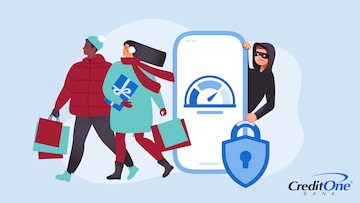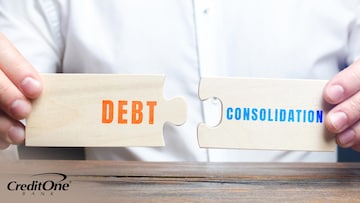
December 07, 2022
How do you go from an old life of debt to a new life of financial strength and stability? Just setting and following a few strategic goals will help get your finances back on track.

Every year, millions of Americans make lists of things they’d like to change in the upcoming new year. For many, topping the list is better money management. In fact, of those who make New Year’s resolutions, more than half of them typically vow to improve their finances.
As the year draws to a close, you may be thinking about what you want to do differently next year. If one of your priorities is to pay down debt, here are seven resolutions that could help you achieve your goal.
#1: Resolve to Identify Your “Why”
Paying down debt can be a challenge. It requires consistency over a potentially long period of time, especially if you owe larger amounts. And remaining motivated requires tapping into the emotional power of your subconscious mind.
So before you create a plan to reduce your debt, consider why paying down your debt is important to you. Will it allow you to save for a down payment on a house? Help pay for your child’s college education? Let you enjoy a financially secure retirement? Your reasons could help you stick with your plan—even if you sometimes feel like giving up.
#2: Resolve to Be Honest About How Much You Owe
You don’t need to announce it to the world, but you at least need to be honest with yourself about how much you really owe. Denying your debt situation will only keep you where you are … or even make matters worse.
So if you’ve never added up the balances on all of your accounts to come up with a total sum owed, it’s time you did. You may be pleasantly surprised by what you find, or you might be shocked to discover just how high the amount you owe actually is. Either way, you need to know how much debt you have before you can create a realistic plan to eliminate it.
#3: Resolve to Create a Budget—But Be Realistic
Many Americans set aggressive resolutions that fizzle out only a few weeks into January. You know the ones: work out seven days a week, never eat another piece of junk food, or meditate every day. Then life gets in the way and some or all of those well-intentioned resolutions quickly go out the window.
If you’re serious about paying down your debt, you’ll need to cut back on non-essential spending and look for ways to reduce spending on essential items. But be realistic when creating your budget, because if it’s too extreme, you likely won’t stick with it for very long. On the flip side, if it’s too lenient, it probably won’t do much to help reduce your debt. And sticking to a realistic budget is critical for success.
Identify areas where you can cut back but leave room for a little fun, too. Instead of two or three content streaming services, maybe try getting by with just one. Or perhaps stop putting premium-grade gasoline into your car when your owner’s manual specifies that it’ll run fine on mid-grade.
Be specific about what you will and won’t spend money on and how much you’ll allocate to each category (like groceries, transportation, or clothing). Consider using the envelope system for budgeting while you’re paying off debt. This method helps ensure that, once you’ve spent your allocated money for a specific category, you don’t buy any additional items falling into that category until a future budget period.
Once you’ve taken care of the essentials, you can then decide how much you’ll allocate to debt payments each month and incorporate that amount into your budget.
#4: Resolve to Automate Your Payments
Automate as many debt payments as possible, which helps ensure that your bills get paid on time. It could also save you time each month by eliminating the need to sort through bills, write checks or manually make online payments. Plus, if your money is automatically going toward paying down debt, you won’t have the opportunity to spend those funds on other things that aren’t helping your debt-reduction crusade. The only caveat is to make sure you have enough funds in your account to cover these payments each month, because you definitely don’t want them to bounce.
#5: Resolve to Track Your Spending
Setting a budget is important, but if you don’t keep track of the money you’re spending, you could get to the end of the month and realize you’ve spent more than you planned. To help avoid overspending, track every purchase you make. It doesn’t matter how you do it … as long as you actually do it. You can write everything down on a piece of paper, use a mobile app, or regularly monitor all your credit card and banking statements. Just make sure you know how much you’ve spent and how much you still have to spend to get you through the remainder of the month.
Keep in mind that sometimes when you buy a product for delivery, the payment doesn’t post to your account until it ships. So if you look in your bank account and see a balance of $1,500 but you recently bought something that costs $700, you really only have $800 left. This is why it’s important to make note of what you bought and do the math before making a conclusion about your finances.
#6: Resolve to Keep an Emergency Fund
An emergency fund may not help you reduce existing debt, but it can be an important resource in helping prevent additional debt. According to a January 2022 Bankrate survey, nearly 60% of Americans would not be able to cover an unplanned $1,000 expense without borrowing it or relying on credit cards. But, if you have an adequate emergency fund, you can use money from it to help cover the cost of an unforeseen expense and hopefully avoid taking on additional debt.
If you don’t already have some savings for a rainy day, try to allocate at least a small amount of money each month to an emergency fund. You’ll be glad you have it when you don’t have to go deeper into debt to pay a medical bill or car repair you never planned for.
#7: Resolve to Celebrate Small Victories
Paying off debt is a marathon, not a sprint. Without a little something to look forward to once in a while, it can be tough to stick with your plan. So celebrate small wins by treating yourself to something you enjoy that won’t break the bank. Go ahead and buy that $5 pint of ice cream that isn’t typically part of your grocery budget. Celebrating your progress could help you stay motivated to reach your goal. And your debt-reduction journey doesn’t have to be all drudgery and going without.
Reducing your debt won’t happen overnight. It takes time, dedication, and patience. But it could be well worth it if reducing or eliminating your debt allows you to focus on other financial goals that contribute to creating the life you want to live.



